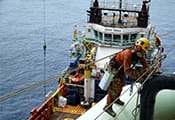What are Warranties in Marine Insurance?
Warranties in marine insurance are assurances made by the insured to the insurer regarding specific actions the insured will or will not undertake concerning the insured vessel or ship. These conditions and warranties play a crucial role in determining the insurer's liability when processing claims under the marine insurance policy.
Types of Warranties
Marine insurance includes two types of warranties. These are:
-
Express Warranties
Express warranties are the promises and statements made by the policyholder. The express warranties are clearly stated or written in the deed or certificate of the insurance policy. The express warranties generally include the following conditions.
- Ship's suitability for the intended journey
- Insured party's adherence to good operational and safety standards
- Full disclosure of all relevant information by the insured
- The legality of the consignment and voyage
- Accurate description of the cargo in accordance with applicable laws and regulations
-
Implied Warranties
There are two kinds of implied warranties i.e., seaworthiness and legality of the ship. The implied warranties are not explicitly written in the contract deed. Instead, their existence or creditworthiness is assumed, which forms the insurance contract.
It is explicitly stated that the policyholder must comply with the provisions and clauses of the deed. In addition, he should refrain from committing any fraudulent activity. The policyholder and insurer must act in good faith and should be transparent in dealing with the insurance company.
How do Warranties work in Marine Insurance Policy?
In marine insurance, a warranty is a specific commitment by the insured regarding the vessel's condition or operation. If the insured fails to meet this commitment, the insurer can reject the claim. Marine insurance policies often include both express and implied warranties, which are strictly enforced. Even minor breaches can result in claim denial. Therefore, it is crucial for the insured to understand and adhere to all warranties to maintain valid coverage when filing a claim.
Learn more about Marine Insurance
Seaworthiness of Ship
Ships used for transportation must be properly constructed and well-equipped to withstand the typical stresses of a voyage. The ship must be seaworthy for the intended journey.
- The ship must be reasonably fit to handle common hazards, such as rain at the port.
- Different stages of the journey may require various preparations, and the ship must be equipped accordingly at each stage.
- If the ship is dispatched in an unseaworthy condition, the insurer has the right to reject the claim.
Delay
The insured should not delay the start of the journey. If a delay occurs, the insurance company will reject the claim.
Deviation
The insurance company's liability ends if there is any deviation from the planned route.
Change in Destination
The insurance company is not liable for a claim if the destination changes after the risk has begun.
Conclusion
Understanding the warranties in marine or cargo insurance is essential for both the insurer and the insured. These warranties, whether express or implied, define the conditions under which insurance coverage is provided. They ensure the proper construction and operation of the vessel, adherence to safety standards, and legal compliance. Breaches of these warranties can lead to claim denials, emphasizing the need for policyholders to meticulously follow the terms of their insurance agreements. By comprehending and adhering to these warranties, insured parties can maintain the validity of their coverage, thereby securing their interests and ensuring smooth marine operations.


































 Expert advice made easy
Expert advice made easy


